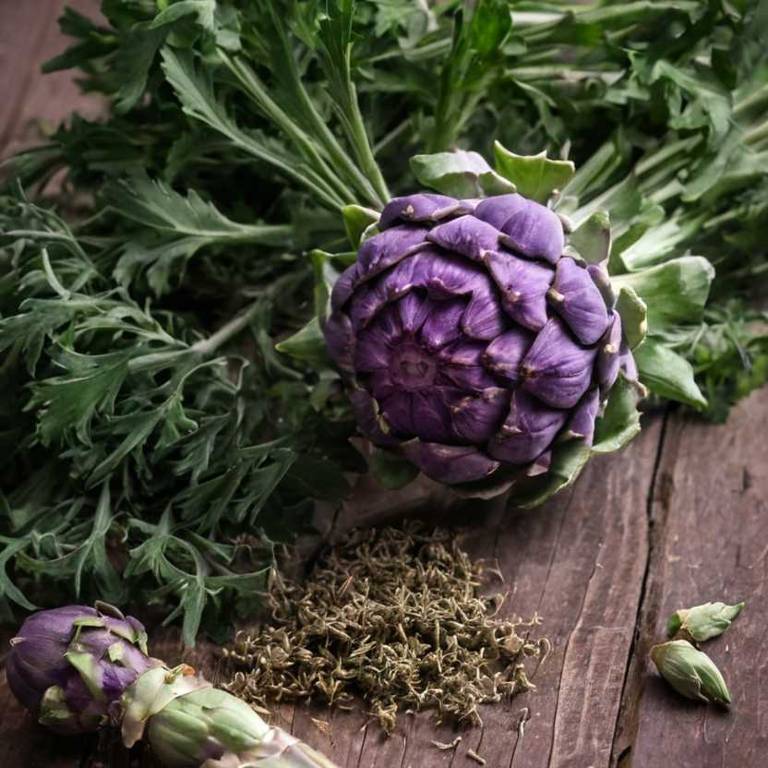Artichoke (Cynara scolymus)
Artichoke (Cynara scolymus) is a member of the Asteraceae family, native to Mediterranean Region, Southern Europe, and North Africa. Traditionally, its leaves, flowers, and stems have been used for infusions, decoctions, and culinary uses.
This herb is particularly valued for its bitter, anti-inflammatory, and tonic actions, and has a long history of use in european herbal medicine, mediterranean herbal traditions, and traditional chinese medicine.

Quick Facts / Key Information
| Common Name | Artichoke |
|---|---|
| Scientific Name | Cynara scolymus |
| Plant Family | Asteraceae |
| Genus | Cynara |
| Species | scolymus |
| Native Range | Mediterranean Region, Southern Europe, North Africa |
| Plant Parts Used | Leaves, Flowers, Stems |
| Primary Medicinal Actions | Bitter, Anti-Inflammatory, Tonic |
| Primary Traditional Systems | European Herbal Medicine, Mediterranean Herbal Traditions, Traditional Chinese Medicine |
| Historical Preparation Methods | Infusion, Decoction, Culinary Use |
Botanical Identity
- Scientific Name
- Cynara scolymus
- Common Name
- Artichoke
- Synonyms / Alternative Names
- Cardoon, Globe Artichoke, Globe Thistle
- Plant Family
- Asteraceae
- Genus
- Cynara
Botanical Description
- Growth Habit
- Perennial herbaceous plant.
- Height
- It typically grows to a height of 1 to 2 meters.
- Leaves
- Broad leaves with upper surface glaucous green and lower surface pale white, featuring prominent stomatal bands.
- Flowers
- Inflorescence composed of dense, spirally arranged heads each containing numerous scale-like bracts and a central cluster of tubular florets with violet to purple pigmentation, arranged in a head with actinomorphic symmetry.
- Stems
- Cylindrical, erect, branching at nodes, surface glabrous, with a pith that is white and spongy.
Traditional Uses / Historical Use
Traditional Systems
- European Herbal Medicine
- Mediterranean Herbal Traditions
Historical Preparation Methods
- Infusion
- Decoction
- Culinary Use
- Poultice
Medicinal Actions
- Bitter
- As described in traditional systems, a gentle bitter, in taste-driven classifications.
- Anti-inflammatory
- Historically regarded as a moderate anti-inflammatory, for irritation-related applications.
- Tonic
- Commonly referenced as a warming tonic, for foundational support.
- Carminative
- In herbal texts, considered a soothing carminative, in relation to gastrointestinal comfort.
Active Compounds
- Flavonoid
- Naturally occurring polyphenols that contribute to pigmentation and structural chemistry.
- Phenolic Acid
- A class of aromatic plant compounds commonly found in leaves, seeds, and stems.
- Coumarin
- A class of aromatic organic compounds found in many plant species.
- Tannin
- A group of compounds frequently present in plant tissues exposed to herbivory.
Modern Research Overview
This section is reserved for future summaries of scientific research related to this plant. As additional verified sources are reviewed, relevant study information will be added here.
Safety & Contraindications
- General Precautions
- The use of this herb may warrant general caution in certain situations.
- Contraindications
- Contraindications for this herb are not clearly established in available sources.
- Allergies
- Allergic reactions associated with this herb have not been well documented.
- Drug Interactions
- There is insufficient evidence to determine whether this herb interacts with pharmaceutical drugs.
- Toxicity
- Toxic effects associated with this herb have not been well documented.
- Pregnancy & Breastfeeding
- Information addressing pregnancy and breastfeeding-related safety for this herb is limited.
Preparation & Usage Methods
- Infusion
- Water is poured over plant material and allowed to steep before straining.
- Decoction
- Plant parts are gently boiled in water to release soluble constituents.
- Poultice
- Poultices involve external application of prepared plant matter.
- Culinary Use
- A preparation involving the use of plant parts in cooking or food production.
- Powder
- This method converts dried plant material into a uniform powder.
Growing, Harvesting & Storage
Growing / Cultivation
- Soil
- Prefers loamy soil with well-drained conditions. Typically grows best in organically rich soils.
- Sunlight
- Thrives in full sun. Tolerates full sun to partial shade.
- Watering
- Prefers well-balanced moisture levels. Tolerates periodic dry conditions.
Medical Disclaimer
The information provided on this page is for educational and informational purposes only. It is not intended to diagnose, treat, cure, or prevent any medical condition. Always consult a qualified healthcare professional before using any herb for medicinal purposes.